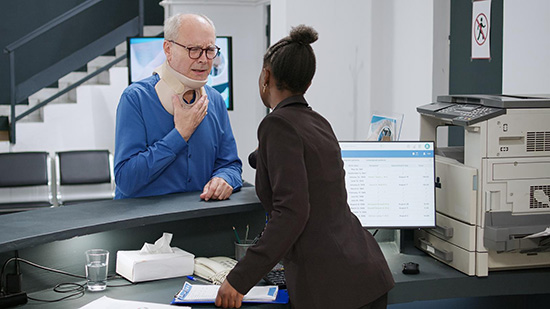Learn about your right to compensation after an injury caused by heavy equipment
The term “heavy equipment” refers to large, heavy-duty vehicles specially designed for executing construction tasks and moving large or heavy materials. While these machines are integral to numerous industries in South Carolina, enabling the execution of large-scale projects that would otherwise be inconceivable, they also come with significant risks to operators and nearby workers.
Fortunately, injured workers and family members of workers who are killed by these machines are eligible for workers’ compensation benefits. This article will help you understand your rights after an accident and explain how to file a claim.
Statistics on work injuries in South Carolina
According to the U.S. Bureau of Labor Statistics (BLS), in 2021 alone, there were 30,300 nonfatal injuries and illnesses in South Carolina, of which 19,900 were severe in nature, requiring time off work or a job transfer.
Some of the top sectors for injuries in South Carolina included the following:
- Mining
- Trade, transportation and utilities
- Manufacturing
- Education and health services
- Construction
Did you know?
According to the National Safety Council, approximately 75% of all struck-by fatalities involve heavy equipment. Each year in the U.S., about 700 workers die from these accidents.
Top industries that use heavy equipment
Many people think of the construction industry when it comes to heavy equipment, but these machines are used in a variety of workplaces, including:
- Agriculture
- Forestry
- Warehousing
- Mining
- Transportation
- Manufacturing
- Oil and gas
- Railways
- Maritime (ports and docks)
- Waste management and recycling
- Landscaping
- Quarrying
- Paving and roadwork
- Demolition
- Utility (water, sewer, electric, etc.)
- Logging
- Bulk material handling
- Fisheries
- Aerospace
Common types of heavy equipment
There are several types of heavy equipment commonly found in industrial and construction settings that can be considered dangerous if not used properly or if safety protocols are not followed. Here are some examples:
- Forklifts. Forklifts are industrial trucks used for lifting and moving materials. They can pose dangers if operated improperly, including tipping over, colliding with objects or people, or dropping loads. Lack of proper training, overloading or unsafe driving practices can contribute to accidents.
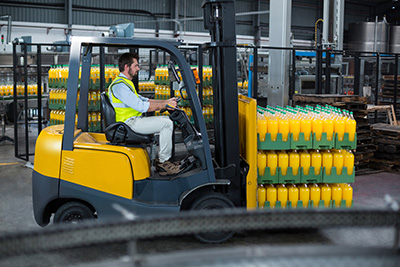
- Excavators. Excavators are large, powerful machines used for digging and moving earth and debris. The rotating arm and bucket pose risks of crushing or striking workers if not operated with caution.
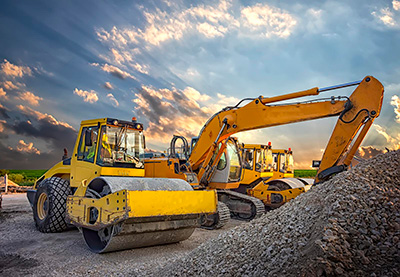
- Bulldozers. Bulldozers are heavy, tracked vehicles equipped with a large blade on the front. They are used for pushing and grading soil and other materials. The size and weight of bulldozers make them potentially dangerous if not operated safely, particularly during grading or leveling operations.
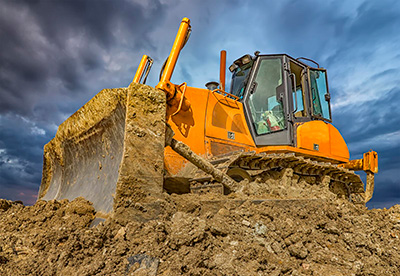
- Cranes. Cranes are tall lifting machines used for hoisting and moving heavy objects. They can pose significant hazards, including the risk of collapse, dropped loads or contact with power lines if not operated by trained personnel following safety protocols.
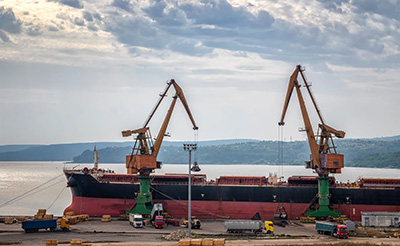
- Backhoes. Backhoes are versatile machines with a digging bucket on the back and a loader on the front. They are commonly used for excavation, trenching and material handling. The swinging arm and the bucket can present a risk of striking workers or nearby objects if not operated with care.
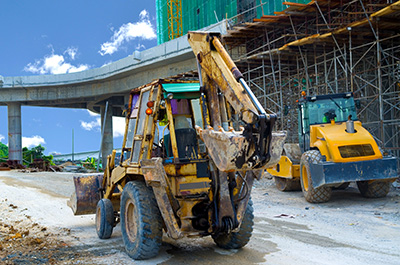
- Loaders. Loaders, also known as front-end loaders or wheel loaders, are used for moving materials such as dirt, gravel or construction debris. The large front bucket can cause accidents if not controlled properly, especially during loading or dumping operations.
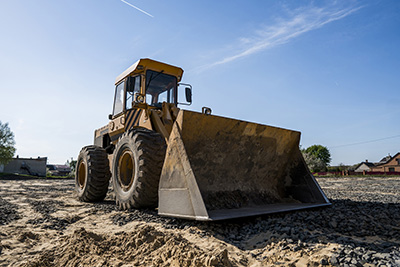
- Pile drivers. Pile drivers are heavy machines used for driving piles into the ground for foundation support or construction purposes. The high impact forces and noise levels involved in pile driving require careful operation and adherence to safety procedures.
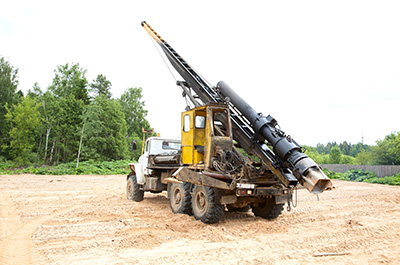
- Grinders and chippers. Grinding and chipping machines are used for cutting or grinding materials such as wood, concrete or metal. They can present risks of flying debris, rotating blades or entanglement if not used with proper safety precautions and personal protective equipment.
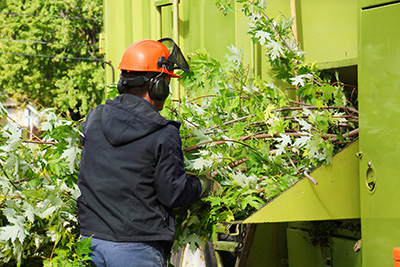
I’ve Been Offered Light Duty—
What Do I Do?
Learn about your options if you’ve been cleared to return to work on light duty.
Common injuries caused by heavy equipment
Heavy equipment accidents can result in a range of injuries, some of which can be severe or even fatal. The specific injuries sustained in these accidents can vary depending on the type of equipment involved, the nature of the incident, and other factors, but may include:
- Crush injuries. Heavy equipment accidents can lead to crush injuries, where body parts are trapped or compressed between equipment components, structures or objects. These injuries can cause severe damage to muscles, bones and organs, resulting in fractures, internal bleeding, amputations or organ damage.
- Struck-by injuries. Workers can be struck by heavy equipment or its components, including being hit by falling objects, swinging arms, buckets or moving parts, resulting in bruises, fractures, lacerations, brain bleeds and spinal cord injuries.
- Entrapment and suffocation. Some heavy equipment accidents can lead to entrapment or suffocation. Workers may become trapped in confined spaces or trenches or within the equipment itself, risking asphyxiation, suffocation, or other severe injuries due to a lack of oxygen or crushing forces.
- Burns and electrical injuries. Heavy equipment accidents involving fires, explosions or contact with electrical sources can cause burns. Workers may suffer thermal burns from flames or hot surfaces; chemical burns from hazardous substances; or electrical burns from contact with live wires or faulty electrical systems.
- Back and musculoskeletal injuries. The physical demands and forces involved in operating or working around heavy equipment can lead to back injuries, strains and sprains. Lifting heavy objects, repetitive motions, or awkward postures can also contribute to these types of overexertion injuries.
- Respiratory injuries. Certain heavy equipment accidents can expose workers to hazardous substances, gasses or airborne particles, leading to respiratory injuries. Inhalation of toxic fumes, dust or chemical vapors can cause lung damage, respiratory distress, and other occupational diseases.
In the news:
Construction worker dies in heavy equipment accident near Lexington county
In April 2023, a 24-year-old man died after a construction accident on I-26 near Lexington County. The coroner identified the man as Ramon Ortiz-Medina. The accident occurred near the 130-mile marker of Interstate 26 eastbound in Lexington County, where Ramon was working as part of a crew paving the road. Details of the incident were not released, but regardless of the cause, his family members should be entitled to workers’ compensation death benefits.
Top causes of heavy equipment accidents at work
Human error is a leading cause of heavy equipment accidents. Operator mistakes, such as improper operation, distraction, fatigue or reckless behavior, often result in accidents. Other common causes of these accidents include the following:
- Insufficient training or inadequate supervision of equipment
- Poor maintenance or inadequate equipment inspections
- Inadequate safety measures like a lack of proper guarding or protective devices, insufficient safety barriers, or absence of warning systems
- Lack of communication and coordination between equipment operators, ground workers and supervisors
- Environmental factors like rain, snow, low light conditions or uneven or unstable ground
- Overloading and improper load handling
Overview of workers’ compensation in South Carolina
Workers’ compensation provides certain benefits to injured workers. In South Carolina, most employers with 4 or more employees are required to purchase workers’ compensation insurance to cover their workers in the event of an on-the-job injury or illness. Casual workers, independent contractors and agricultural workers are among the workers that typically don’t qualify for benefits.
Individuals are eligible for compensation as long as they’re injured while performing work within the scope of their employment. Because workers’ comp is a no-fault system, injured employees are covered under workers’ compensation regardless of fault.
What benefits are injured workers entitled to after a heavy equipment accident?
Workers’ compensation includes the following benefits:
- Medical benefits that cover all necessary medical expenses, appointments and procedures
- Wage replacement benefits that cover two-thirds of a worker’s average weekly wage if they have to take time off work to recover
- Death benefits for certain dependents if a worker dies from their injury, including funeral expenses and lost income
Workers who suffer a severe work-related injury may be entitled to lifetime medical benefits.
Workers’ Compensation When You Have Multiple Jobs
Learn how having more than one job can affect your workers’ compensation benefits.
What are the steps for filing a workers’ comp claim in South Carolina?
To get workers’ compensation benefits in South Carolina, it’s essential that you follow these steps:
- Seek immediate medical attention, and be sure to mention that the injury occurred at work so it’s appropriately documented. You may be directed to see a doctor designated by your employer in non-emergency situations.
- Report the injuries to your supervisor or the human resources department within 90 days.
- It’s your employer’s responsibility to file a claim with their insurer. If they refuse to do so, you can file one yourself by submitting Form 50 to the South Carolina Workers’ Compensation Commission.
If your employer refuses to file a claim, it’s a good indication that they’re not going to follow through on their obligations under South Carolina law. While you can file a claim yourself, it’s better to enlist the help of an experienced work injury attorney to ensure your rights are protected.
An attorney can also help you with an appeal if your claim is denied, but the sooner you contact them, the better.
What other legal options may be available after a heavy equipment injury?
Besides workers’ compensation, injured workers may have additional legal options to pursue compensation after a heavy equipment injury. One of the primary routes is through a third-party liability claim in instances where a third party (someone other than the employer) was responsible for the accident.
Some potentially liable parties include the following:
- Equipment manufacturers. If the heavy equipment had a defect or malfunctioned due to its design or manufacturing process, the manufacturer of the equipment might be held liable.
- Property owners. If the injury occurred due to hazardous conditions on a property not owned by the employer, the property owner might be responsible.
- Subcontractors. On many job sites, especially in construction, multiple entities might be working simultaneously. If a subcontractor’s negligence led to the injury, they could be held accountable.
- Equipment maintenance companies. If a third-party company was responsible for maintaining the equipment and failed to do so properly, leading to an injury, they might be liable.
- Operators. If another person, not employed by the same company as the injured worker, was operating the equipment negligently, they might be held responsible.
Pursuing a third-party claim can be advantageous as it allows the injured worker to recover damages not covered by workers’ compensation, such as pain and suffering and full lost wages. However, these cases can be complex, and it’s beneficial to consult with an experienced attorney to understand all potential avenues of recovery.
Contact an experienced South Carolina work injury attorney
Accidents with heavy equipment often result in catastrophic injuries that require a lifetime of medical care. If you find yourself in this situation, it’s imperative that you consult with an experienced workers’ compensation attorney before accepting a settlement offer from your employer’s insurance company.
These initial settlement offers are rarely sufficient to cover all your future medical costs and lost wages, and once you accept an offer, you won’t be able to negotiate more money down the road.
At Chappell, Chappell & Newman, we can give you an estimate of how much your case should be worth and negotiate with the insurance company on your behalf to ensure you get maximum benefits. Contact our office today for an absolutely free consultation of your case to learn more about your rights.


